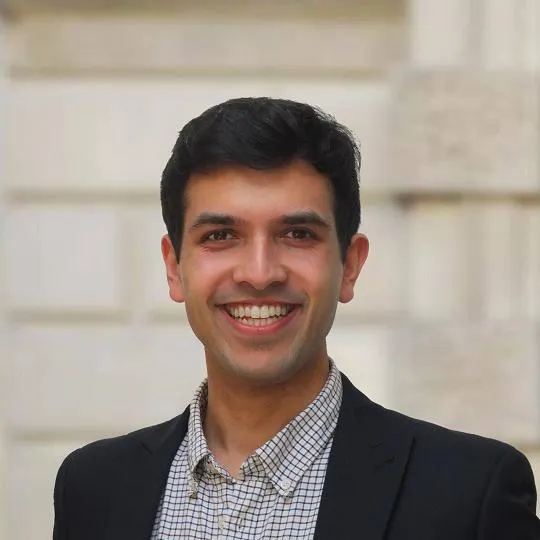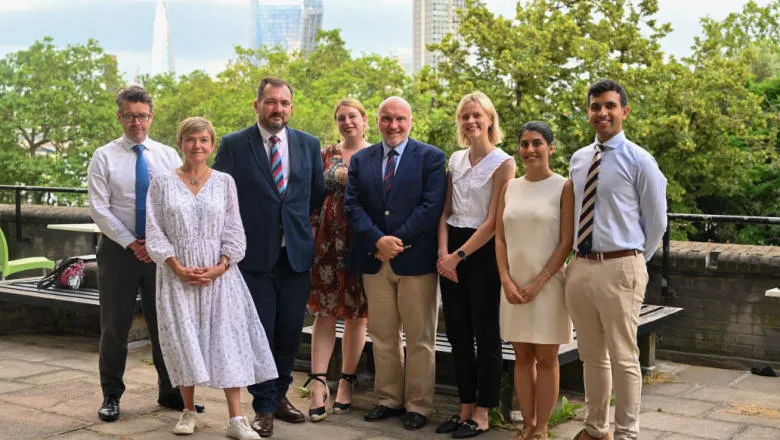
Biography
Arun Dawson is a PhD candidate at the Freeman Air and Space Institute, King’s College London, and a Researcher with the RUSI-led Nuclear Deterrence Network (NDN). He specialises in defence acquisition, airpower and grand strategy, from Cold War fighter jet procurement in his doctorate to working with the NDN on analysing the UK’s resumption of an airborne nuclear deterrent. Arun brings a multidisciplinary perspective to these topics, having trained in both engineering (Oxford) and security studies (King’s).
Alongside his academic career, Arun serves as Parliamentary Researcher to The Lord Stirrup, former Chief of the Defence Staff (2006–2010). He previously held roles at NATO Headquarters, the Baltic Defence College and the Smithsonian Institution, the latter as a Guggenheim Fellow. His expertise is sought by a range of public and private sector clients, and by media outlets such as the BBC and The Conversation, on subjects spanning drones to the "Chinese Spy Balloon." Arun was awarded the Associateship of King’s College in 2024.
Research Interests
Air Power
Defence acquisition
Deterrence
Economics of British defence policy
War, technology and innovation
Recent Publications
- (with Aleix Nadal) ‘Concept to Combat: The Royal Air Force, Small Drones and the War in Ukraine’, European Review of International Studies 11, 3 (2025): 321-357
- ‘The case for RAF Arctic and High North readiness’, Freeman Commentary (Freeman Air and Space Institute, 2023)
- Higher Level Airspace: An International Analysis of Current Trends and Strategic Drivers (North Atlantic Treaty Organization, 2023), ISBN 978-92-845-0222-6
- ‘Cold Comfort: The Challenges Facing the RAF’s Return to the Arctic’, Freeman Paper 12 (Freeman Air and Space Institute, 2022), ISSN 2754-0510
- ‘Changes in the Pipeline: The Green Energy Transition and USA Futures’, contribution to Global Strategic Trends 7th edition (Ministry of Defence Development, Concepts and Doctrine Centre, 2021)
He has also contributed as a research assistant to projects including Paul Kennedy’s Victory at Sea (Yale University Press, 2022); John Gearson’s Operation Banner Primer: An Account of the British Military’s Deployment to Northern Ireland, 1969-2007 (Centre for Defence Studies, 2022); and Jamie Gaskarth, Maeve Ryan and William Reynolds’ UK Strategic Defence Reviews since 1998: Planning, Implementing and Learning from Outcomes (forthcoming).
Teaching
Arun teaches RAF officers on the IOD course at the UK Defence Academy and undergraduates on the History of the International System module at King’s. He regularly gives guest lectures in the UK and overseas.
Research Project Summary:
States seem to arm sub-optimally - why?
This thesis addresses the apparent divergence between political objectives and the military capabilities acquired to achieve them – the ‘grand strategy–defense strategy gap’ (Brands & Montgomery, 2020). It contends that conventional explanations for the “gap” overlook the multifunctional character of military power and airpower in particular. This arises from a conceptual limitation: grand strategy often categorises capabilities as military, economic or diplomatic when in practice they can and often do fulfil multiple roles. Thus, what appears as a mismatch between force design and strategic intent may instead reflect the complex and at times contradictory demands placed on military capabilities within the broader architecture of grand strategy.
To support this argument, the thesis examines six cases of British combat air procurement, spanning the Suez Crisis to the end of the Cold War. These cases reveal that decisions about fighter jets were rarely dictated by military utility alone. Rather, they embodied broader diplomatic and economic imperatives, too. Aircraft procurement thus became a tangible medium through which rival grand strategies – Atlanticist, European or autonomist – were expressed and contested.
Grounded in extensive archival research in the UK and abroad, this study contributes to long-running debates about twentieth-century Britain. It reframes narratives of decline, not to dismiss them, but to reveal a more complex story shaped as much by adaptation as retreat. In doing so, the thesis engages with the broader question of how middle powers conceive and conduct grand strategy.
Finally, by situating defence procurement within the “long view”, this project illuminates enduring dilemmas facing contemporary policymakers: sovereignty versus alliance dependency, capability versus cost, and technological ambition versus operational risk. These tensions are not anomalies of the present but structural features of international politics, made only more acute by the renewed uncertainties of great-power competition.
Supervisory Team: Professor John Gearson and Dr David Jordan
Research

Freeman Air and Space Institute
Freeman Air & Space provides independent, original knowledge and analysis of air and space power issues.

Economic Conflict & Competition Research Group
The ECCRG aims to be an academic centre of excellence for developing sustained, inter-disciplinary research on the study of Economic Warfare.
News
Freeman Air and Space Institute marks three-year anniversary
The Freeman Air and Space Institute, based in the School of Security Studies, celebrates three years since its inaugural launch.

The case for RAF Arctic and High North readiness
As we mark the one year anniversary of Russia's invasion of Ukraine. Freeman's PhD fellow, Arun Dawson, reflects on the case for Arctic and High North...

Collaborative conference in Paris considers the Strategic and Military Consequences of the End of the Cold War
A hybrid conference held in Paris, organised by the Sir Michael Howard Centre and Sciences Po

Research

Freeman Air and Space Institute
Freeman Air & Space provides independent, original knowledge and analysis of air and space power issues.

Economic Conflict & Competition Research Group
The ECCRG aims to be an academic centre of excellence for developing sustained, inter-disciplinary research on the study of Economic Warfare.
News
Freeman Air and Space Institute marks three-year anniversary
The Freeman Air and Space Institute, based in the School of Security Studies, celebrates three years since its inaugural launch.

The case for RAF Arctic and High North readiness
As we mark the one year anniversary of Russia's invasion of Ukraine. Freeman's PhD fellow, Arun Dawson, reflects on the case for Arctic and High North...

Collaborative conference in Paris considers the Strategic and Military Consequences of the End of the Cold War
A hybrid conference held in Paris, organised by the Sir Michael Howard Centre and Sciences Po

